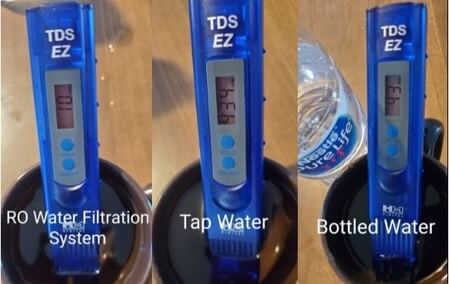Reverse osmosis is an effective water filtration and purification process. It is a method of removing contaminants from water by applying pressure.
Many businesses and homes use RO for different water purification purposes since it’s highly reliable. At home, they help improve tap water and reduce arsenic from well water.
Although great, it isn’t a method without shortcomings. Reverse osmosis water can actually create massive problems if used for long.
This post will help you learn the problems that can arise from the continuous use of RO water.
Disadvantages of RO Water
Can lead to Adverse Health Effects
Consuming reverse osmosis water even for a few months can lead to lead to serious health effects. It has actually been scientifically proven that drinking RO water causes more bodily harm than most contaminants present in tap water.
There’s no doubt that reverse osmosis systems remove impurities, but it’s also true that they also remove 92-99% of essential minerals from the water.
And after analyzing a great number of scientific studies on reverse osmosis water, the WHO states that this water has a definite adverse influence on animals and human organisms.
In a study done on the Czech and Slovak populations, individuals who consumed RO water developed various health complications in months. These included magnesium and calcium deficiency that; led to tiredness, cardiovascular disorders, weakness, and muscular cramps.
Doesn’t Taste Great at All
One of the greatest disadvantages of RO water is that you may not like its taste at all. This is because reverse osmosis removes the minerals that you’re most likely used to in the water.
The removal of these minerals gives the water an unusual/bland taste.
For your water to taste great again, you’ll have to introduce an alkaline remineralization filter, which will lead to extra costs.
It Doesn’t Hydrate Well as Alkaline Water.
Alkaline water hydrates the body better than tap water. On the other hand, all indications cite how RO water is less hydrating. In fact, lesser than untreated water.
This is because reverse osmosis water has zero electrolytes. They are filtered out during the filtration process.
Alkaline water is rich in electrolytes and antioxidants that help neutralize harmful free radicals and hydrate the body.
Reverse Osmosis Water is Wasteful
If you have a reverse osmosis unit at your home, you know how much waste water it can produce. For every gallon of purified water, a few gallons of water will go down the drain. Some systems even have a drain ratio of 1:5.
If you have a large household, you’ll even waste more water.
Has Negative Effects on Homeostasis Mechanisms
Frequent consumption of reverse osmosis water might lead to the dilution of electrolytes dissolved in your body water. And if there’s inadequate redistribution of body water between compartments, the function of your vital organs might be compromised.
The side effects of this condition include weakness, tiredness, and headache. If the situation is severe, victims suffer from muscular cramps and impaired heart rate.
Although this claim is yet to be proven scientifically, it’s always good to be on the lookout. If you can get an alternative, the better.
Causes Substantial Loss of Essential Elements when Used for Cooking
It is argued that reverse osmosis water is the best for cooking. That it gives food a great taste. But do you know that it can cause substantial loss of essential elements from food? The losses may reach up to 60% for calcium and magnesium.
In contrast, when you use mineral water for cooking, the loss of these elements is much lower.
Alternatives to Reverse Osmosis Water

Now that we’ve discussed the drawbacks of RO water, let’s focus on alternatives. The best alternative is investing in a whole-home filtration system.
A home water filtration system will give you pure, safe, and healthy water for your family.
These systems filter out all contaminants and chemicals without getting rid of essential minerals. You really need the minerals in your water for your health, right?
The good news is that there are many such systems available to suit your home needs. Some of these filtration systems feature various stages that help take out ammonia, chlorine, chloramines, heavy metals, and other chemicals.
Also, you can choose to get a reverse osmosis system with an additional stage for remineralization(check price on amazon). During remineralization, essential minerals are restored (using an alkaline remineralization filter) to balance water pH and give it a great taste.
Conclusion
Although RO water is free of contaminants and pure, it might not be 100% safe for you to consume all the time(1). It has some adverse effects that make some people shy away from using them in their homes.
If you belong to this category, go for a reverse osmosis system that allows for remineralization. This way, you’ll enjoy pure water that is tasty and rich in all essential minerals.